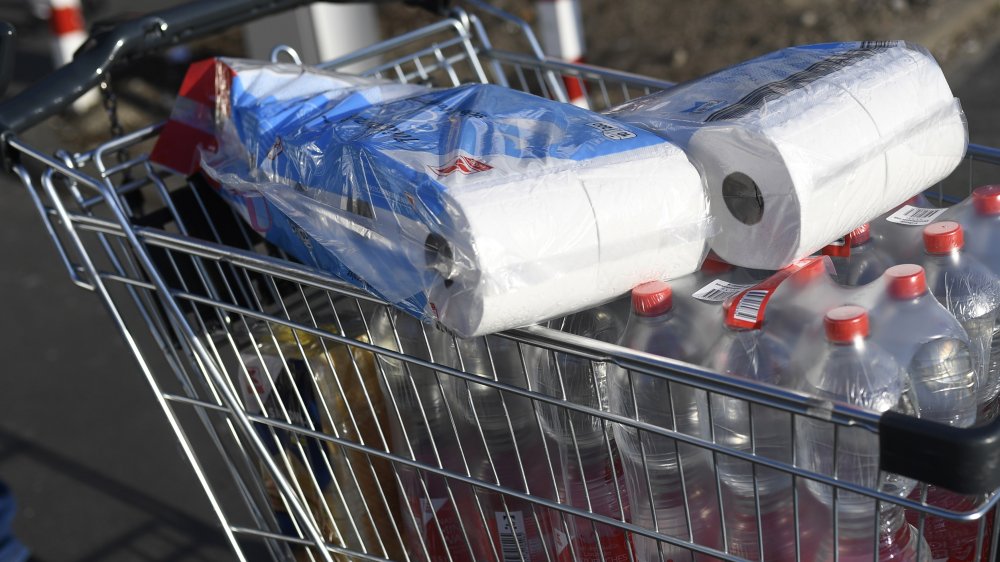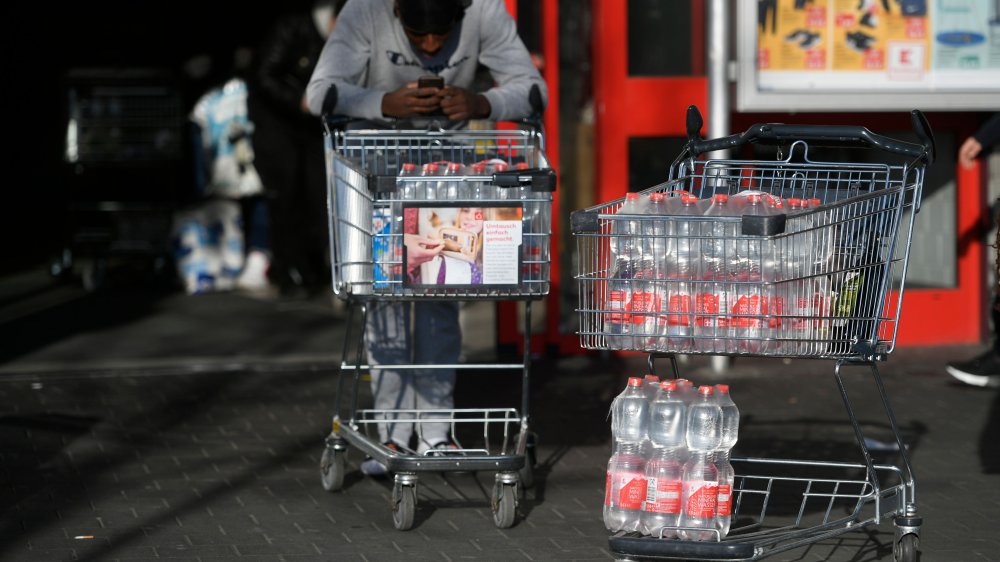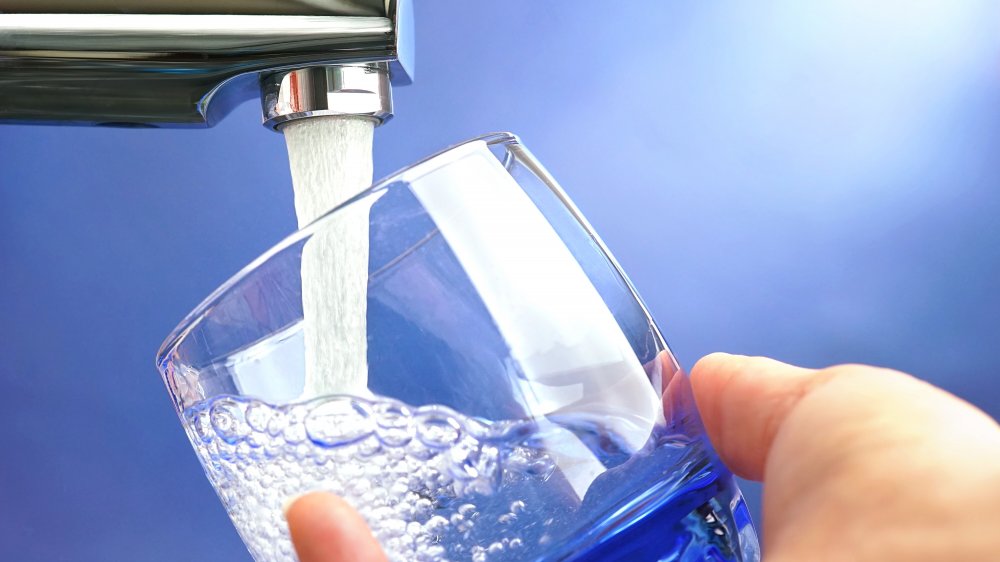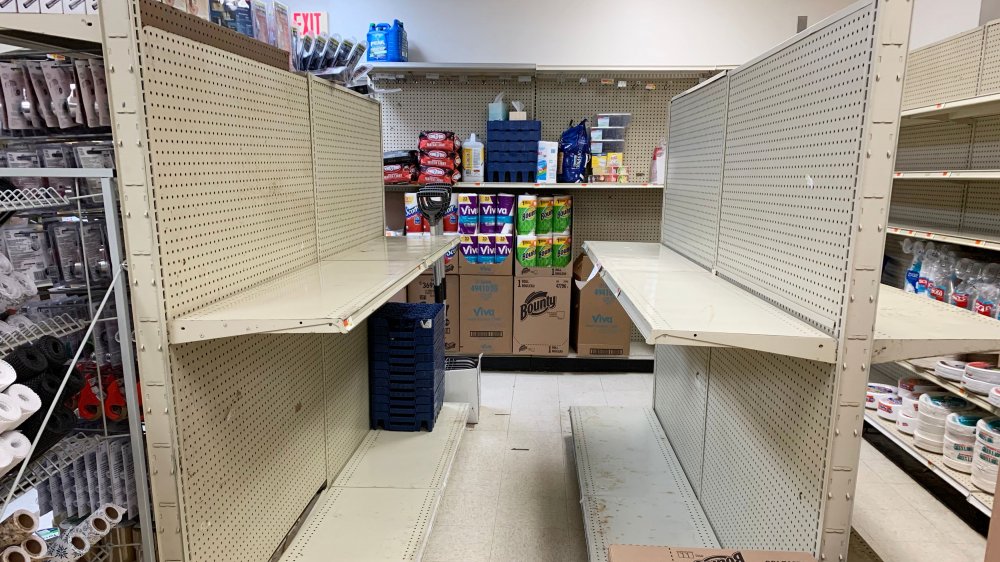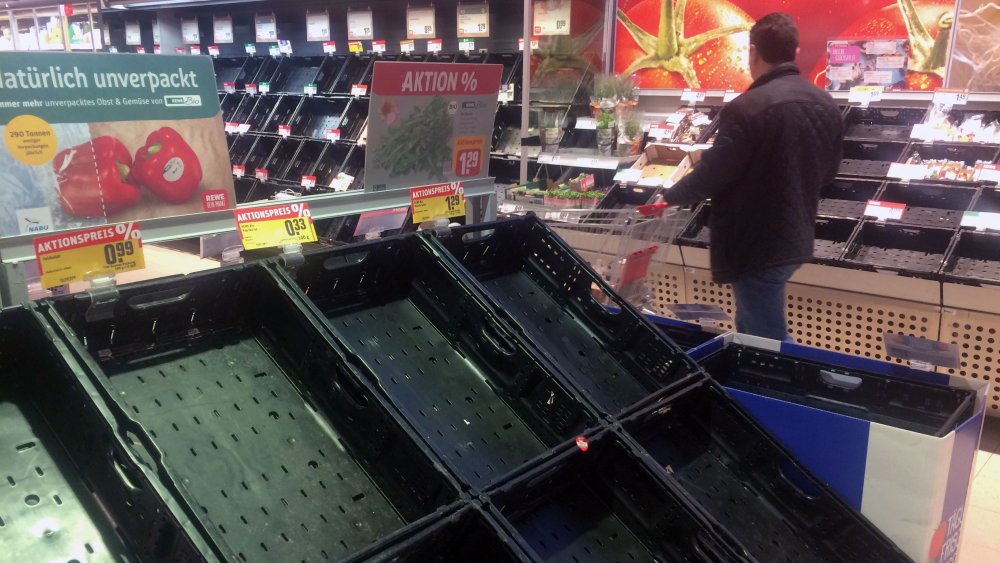The Real Reason People Are Buying So Much Water
With the novel coronavirus, also known as COVID-19, spreading across the world, a lot of people are starting to panic. Many are starting to stock up on household essentials in an effort to practice social distancing and avoid leaving their homes as much as possible in the coming weeks. People are stockpiling everything from groceries to toilet paper to water, causing many stores to put limits on just how many of such items people can buy (per USA Today).
While it's understandable why people are stocking up on food, why are they stocking up on water, even in places that have access to safe and clean drinking water from the tap? Is there actually a need to stock up on bottled water?
Why are people buying so much water?
So why are the masses determined to buy dozens of cases of water at a time? The reason is more psychological than practical. "It's about 'taking back control' in a world where you feel out of control," psychologist Paul Marsden told CNBC.
Social psychology professor Sander van der Linden said that the way the coronavirus pandemic is being handled in the U.S. is making people panic even more, leading to them buying goods to feel more secure. "In the U.S., people are receiving conflicting messages from the CDC and the Trump administration," he said. "When one organization is saying it's urgent and another says it's under control, it makes people worry."
Van der Linden added that other people are stockpiling things like water simply because that's what they see others around them doing. "When people are stressed their reason is hampered, so they look at what other people are doing," he said. "If others are stockpiling it leads you to engage in the same behavior. People see photos of empty shelves and regardless of whether it's rational it sends a signal to them that it's the thing to do."
Is there a danger of the water supply being turned off?
Experts say that in the current coronavirus pandemic, there's no real need to stockpile bottled water out of a fear that your water supply will be shut off. As Slate noted, it would take a cataclysmic crisis for tap water to stop flowing and there is no indication that enough people would become infected by coronavirus that water utilities wouldn't be able to function. Wuhan, the city in China where the coronavirus outbreak is thought to have started, did not have their water supply affected, and the rest of the world will likely see that same outcome.
While it's always a good idea to have a small store of bottled water on hand as natural disasters such as earthquakes really can disrupt your local water supply, the coronavirus pandemic doesn't pose the same threat.
What else shouldn't you be stockpiling?
Water isn't the only thing that people are stockpiling. There are a lot of things that people are buying in bulk that they simply don't need to. "Right now, people are doing incredibly silly things," pandemic planner and crisis management expert Regina Phelps told CNBC Make It.
Phelps urged people to buy food, but to only buy things that they would normally eat rather than throw things into a shopping cart that they don't actually like. Phelps also said that, unless you're sick, caring for a sick person, or flying, you don't need to be buying or wearing masks.
You also don't need to stock up on expensive cleaning supplies to keep your house clean during the coronavirus outbreak. "You can't find things like rubbing alcohol or Clorox wipes because people are in a panic," said Phelps, who added that all you really need is bleach and hand soap. "Bleach is super cheap. While it will stain some things and you can't use it on everything, you can use it in your bathroom and on your doorknobs and stuff like that. So you don't really need fancy cleaning stuff."
Hoarding water does more harm than good
While hoarding water and other household goods might seem harmless, buying up everything in sight means that people who may need those supplies go without. Professor and clinical psychologist Steven Taylor told NBC that panic buying can lead to shortages.
"If you see other people stocking their shopping carts in an anxious frenzy, then that can increase the fear or anxiety in other shoppers, leading people to worry about the scarcity of food, medicines or hygienic supplies," he said. "The combination of fear, urgency and perceived scarcity can lead to things like people fighting over hand sanitizer in the supermarket aisles. This creates a sense of urgency and leads people to over-buy, that is buying more supplies than they really need, just to be on the safe side. This can create real shortages because people buy more than they need. So, the fear of scarcity can create real scarcities."
Instead of buying as much as you can, store a two-week supply of necessary items and try to stay calm. While grocery store shelves may be sparse due to people stockpiling, we shouldn't worry that shortages will continue indefinitely. Experts have said that we are in no danger of running out of essential goods. "Our stores are getting stocked every day," Ron Vachris, chief operating officer of Costco, told The New York Times. "Transportation is functioning, our suppliers are working around the clock and the flow of goods is strong."
